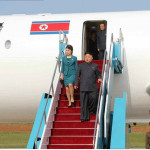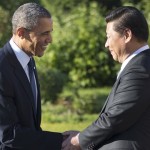- DETERRENCE: J. On-Fat Wong, Security Requirements in Northeast Asia
- DPRK: North Korea Renews Threat of Nuclear Test
- GOVERNANCE AND CIVIL SOCIETY: Do Chinese NIMBY Protests Actually Work?
- CLIMATE CHANGE ADAPTATION: Natural Disasters and a Warming Climate: Understanding the Cumulative Financial Impacts on Victoria
- ENERGY SECURITY: US and China Lift Climate Change Hopes with New Phase of Talks
- AUSTRAL PEACE AND SECURITY: China’s Dismaying New Claims in the South China Sea
 DETERRENCE: J. On-Fat Wong, Security Requirements in Northeast Asia, dissertation, University of Wisconsin, 1982
DETERRENCE: J. On-Fat Wong, Security Requirements in Northeast Asia, dissertation, University of Wisconsin, 1982
In 1982, Wong posited that by 1990, every state in Northeast Asia had gone nuclear. Given their vulnerability, “This condition of pre-emptive instability suggests that among the small powers, “mutual vulnerability” or “mutual probable destruction” is a much more appropriate description of their strategic relationship than “mutual assured destruction.”” [PDF, 19.9MB]
- “Mutual Probable Destruction”: Nuclear Next-Use in a Nuclear-Armed East Asia? Peter Hayes, NAPSNet Policy Forum, May 13, 2014
- Under Threat, South Koreans mull nuclear weapons, K. J. Kwon, CNN, March 18, 2013
- The South Korean Case: A Nuclear Weapons Program Embedded in an Environment of Great Power Concerns, volume II, Regional Rivalries and Nuclear Responses, Brian Jack et al, Panheuristics Final Report to US Defense Nuclear Agency, DNA 001-77-C-0052, February 28, 1978, pp. II-82 to II-93 [PDF, 4.9MB]
 DPRK: North Korea Renews Threat of Nuclear Test, Jack Kim, Mark Felanthal, Reuters News Agency, 10 May 2014
DPRK: North Korea Renews Threat of Nuclear Test, Jack Kim, Mark Felanthal, Reuters News Agency, 10 May 2014
North Korea reiterated threats to conduct a new type of nuclear test. It is helpful that they have not yet done so, even though they recently conducted ICBM rocket engine tests. The Comprehensive Test Ban Treaty Organization (CTBTO) maintains around 280 monitors ready to detect any nuclear testing – North Korean or otherwise. Sustained DPRK threats and other issues are forcing Japanese leaders to change their thoughts on “collective self-defense”. Although the move is aimed at North Korea, China views it as an extremely negative complication of their security situation.
- News Analysis: caution amplifies about Japan’s right to collective self-defense, Xinhua News Agency in (China) People’s Daily Online. (8 May2014)
- N Korea ICBM engine tests stoke nuclear fears. AFP. (2 May 2014)
- Monitoring body ‘ready’ to detect’ any North Korea nuclear test, Fredrik Dahl, Reuters News Agency. (9 May 2014)
 GOVERNANCE AND CIVIL SOCIETY: Do Chinese NIMBY Protests Actually Work?, Alexa Olesen, Foreign Policy, 13 May 2014
GOVERNANCE AND CIVIL SOCIETY: Do Chinese NIMBY Protests Actually Work?, Alexa Olesen, Foreign Policy, 13 May 2014
Chinese citizens have increasingly demonstrated against proposals that pose negative environmental impacts to communities, resulting in delays of projects. However, whether these protests actually succeed in preventing proposals may be questioned, as disputed factories are simply moved to another community. Protestors in Hangzhou have forced the government to halt plans for a waste incinerator, but many question the government’s sincerity.
- China waste incinerator protest turns violent, Lucy Hornby, Financial Times (11 May 2014)
- Dozens held over violent waste incinerator protest in eastern Chinese city, Yang Fan, Radio Free Asia (12 May 2014)
- Suspicion greets China’s pledge on incinerator, Jack Chang, Associated Press (12 May 2014)
 CLIMATE CHANGE ADAPTATION: Natural Disasters and a Warming Climate: Understanding the Cumulative Financial Impacts on Victoria, Tom Delbridge and Cam Walker, Friends of the Earth, Melbourne, Australia, 2014 [1.08 MB, PDF]
CLIMATE CHANGE ADAPTATION: Natural Disasters and a Warming Climate: Understanding the Cumulative Financial Impacts on Victoria, Tom Delbridge and Cam Walker, Friends of the Earth, Melbourne, Australia, 2014 [1.08 MB, PDF]
Despite recent various warm weather anomalies, including the latest warm winter and the abnormally early fire events in New South Wales, certain commentators flatly refuse to acknowledge or even discuss the impact that a warming climate might be having on the frequency and severity of natural disasters. We are not suggesting that the warming climate started the catastrophic fire events that unfolded in October 2013, but to ignore a discussion regarding the influence of background warming is to be blind to the potential truth.
- QLD Floods Linked to Climate Change, Robert Birsel, SBS News (23 August 2013)
- Disaster Mitigation and Preparedness in a Changing Climate, James P. Bruce,
- Ian Burton and I.D. Mark Egener, Global Change Strategies International (2000) [148 KB, PDF]
 ENERGY SECURITY: US and China Lift Climate Change Hopes with New Phase of Talks, Pilita Clark, Financial Times, 27 April 2014
ENERGY SECURITY: US and China Lift Climate Change Hopes with New Phase of Talks, Pilita Clark, Financial Times, 27 April 2014
Another diplomatic dance begins. It is not romance, but there will be ample show of wooing, pleas, pleasing, demanding and resisting, enticements and threats. An anachronism of the Cold War, pre-globalization era has trapped governments so that crises staring in the face are ignored, and parliamentary hearings can be used to manufacture fictitious ones – the Great Lime Shortage or Anthropogenic Global Warming.
- Hurricane predictions were off last year. Will this year be any better?, Jenny Staletovich and Miami Herald, Published: April 22
- Why everyone’s talking about the great lime shortage, Neil Irwin, New York Times, 25 April 2014
 AUSTRAL PEACE AND SECURITY: China’s Dismaying New Claims in the South China Sea, Armed Forces Chief Moeldoko, Wall Street Journal, 25 April 2014
AUSTRAL PEACE AND SECURITY: China’s Dismaying New Claims in the South China Sea, Armed Forces Chief Moeldoko, Wall Street Journal, 25 April 2014
Two Indonesian shifts with portents for the pivot? At home, the race for president is closer than expected: populist Joko Widodo paired with billionaire culture of impunity representative Abdurizal Bakrie, against atrocity-suspect Prabowo Subianto backed by a brace of Islamic parties. At sea, “dismayed” military chief Moeldoko bolted from neutrality on nine-dash line maps: China’s “behavior in the South China Sea will define broader perceptions of its intentions.”
- Indonesia’s presidential vote showdown seen narrowing to two parties: Gerindra, PDI-P, Erwida Maulia and Novy Lumanauw, Jakarta Globe (13 May 2014)
- Prabowo and human rights, Gerry Van Klinken, Inside Indonesia 116 (April-June 2014)
- RAW: Chinese ships ram Vietnamese vessels (Ministry of Foreign Affairs Viet Nam) You Tube (8 May 2014)
The Nautilus Peace and Security Weekly Report presents articles and full length reports each week in six categories: Austral security, nuclear deterrence, energy security, climate change and security, the DPRK, climate change adaptation and governance and civil society. Our team of contributors carefully select items that highlight the links between these themes and the three regions in which our offices are found—North America, Northeast Asia, and the Austral-Asia region.
- Subscribe to NAPSNet to receive free weekly email reports editor:
Contributors:
- Deterrence: Peter Hayes
- Governance and Civil Society: Dyana Mardon
- Climate Change Adaptation: Saleem Janjua
- DPRK: Roger Cavazos
- Austral Peace and Security: Richard Tanter

